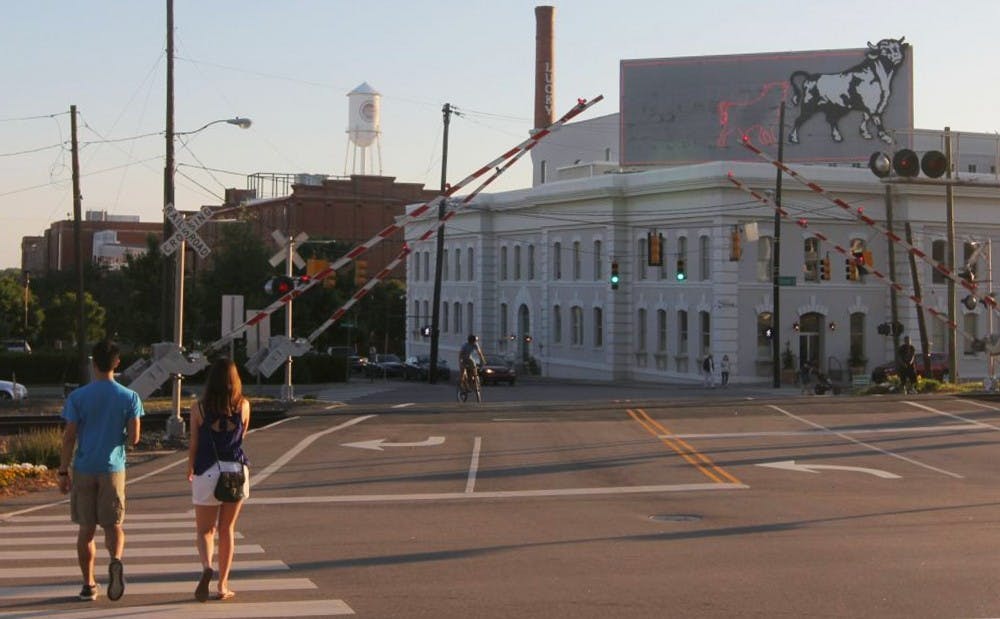The proper role of Duke in Durham affairs was a highlight of discussion at a service-learning event Wednesday afternoon.
Sponsored by the University's service-learning program, the event included Dean of Trinity College Valerie Ashby as well as Eric Mlyn, Peter Lange executive director of DukeEngage. During the forum, which focused on the Duke's relationship with Durham, Ashby emphasized the importance of being able to work with a broad variety of different people in order to succeed at service-learning.
"My experiences showed me that sometimes I work best with people who are not like me," she said. "Because I don't assume things when I don't know that person. The other things that I try to teach my graduate students and some undergraduates also is that if you only think that you can work with people that look like you, then you may also think that you can't get help from people who don't look like you."
One student asked how Duke could work to create service-learning projects that better deal with Durham’s systemic issues, adding that he felt Duke itself may have had a role in these problems' development.
Brandon Hudson—Trinity '06, Divinity '13 and director of the local service organization Urban Hope—agreed and cited what he called “the Duke plantation." He argued that the University has caused gentrification in nearby neighborhoods.
“The more you dig into these questions, the more you realize about the effect Duke has had on the local community,” he said. “If folks have power and resources and privilege in one space, the moves that they make dictate the lives and abilities and options of other people.”
As a potential next step, Hudson encouraged Duke to consider adding a mandatory class on race, class and gender in the South to the first-year course load, arguing that this could improve how students understand such topics. Although Ashby did not comment on that specific proposal during the event, she did note she would love to see a greater Durham focus in the curriculum. But that decision is not in her hands and actually belongs to the faculty, she added.
Sam Miglarese, director of the Duke-Durham Neighborhood Partnership, noted that a new FOCUS program revolving around Durham is set to launch next year.
Another concern raised was whether volunteering in Durham was actually helpful, or if Durham residents were being forced to play along and "re-traumatize themselves" for students' education. Mlyn pushed back against that conception, arguing that the University's partners understand their role as student educators above and beyond their normal community work.
"Most of our community partners conceptualize their role as co-educators and really value that role even though it may not be in their job description,” Mlyn said. “Our partners also report [in their surveys] that they want students to have gotten something out of the summer of DukeEngage that they wouldn’t have gotten."
The discussion also addressed the Duke Career Center's commitment—or lack thereof—to service professions. Some felt that students who wish to explore non-profit opportunities after graduation are not given the same consideration as students going into consulting or finance.
William Wright-Swadel, assistant vice president of student affairs and Fannie Mitchell executive director of the Career Center, acknowledged their complaints. The Career Center team is continually working with the Sanford School of Public Policy to find more opportunities for engagement, he said.
Wright-Swadel also explained that students who are interested in civic engagement often apply to consulting jobs due to the early recruitment process. As a result, they are forced to weigh “a $70,000 job” against other opportunities that may pay significantly less.
“The balance that we have is looking at how we can create a career fair, for example, where 20 percent of the organizations there are not-for-profit, and they have a small table with a tablecloth, and Microsoft has a banner that goes to the top of the room,” Wright-Swadel said. “How do you try to reconcile reality with belief?”
Get The Chronicle straight to your inbox
Signup for our weekly newsletter. Cancel at any time.

